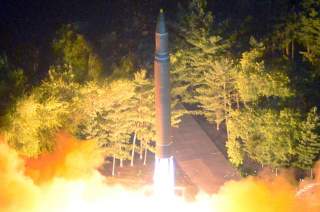Why No North Korean ICBM Test for Christmas?
The holidays have passed without major weapons tests from North Korea, but we’re hardly out of the woods yet. If anything, the risks have increased relative to a month ago.
The holidays have passed without major weapons tests from North Korea, but we’re hardly out of the woods yet. If anything, the risks have increased relative to a month ago.
In April, North Korean leader Kim Jong-un told his national Assembly, “we will be patient and wait till the end of this year to see whether the United States makes a courageous decision or not.” Over the course of the year, several regime officials reinforced this deadline. The Pyongyang carried out a series of tests of short-range missile systems that demonstrated advanced new short-range ballistic missile and large-caliber artillery designs, culminating in a new medium-range solid-fuel missile in October. In early December, the DPRK Ambassador to the UN stated that “denuclearization is already gone out of the negotiation table.” In the weeks leading up to the end of the year deadline, the regime continued to raise expectations that its passage would lead to a major provocation designed to shock the American president. Multiple officials promised that Washington would receive a “Christmas gift.” (The regime previously referred to intercontinental ballistic missile tests as “gifts” to the United States.)
This tactic can best be explained with reference to internal politics, a compromise between officials content to persist with stalled negotiations and internal hardliners pressing for the end of negotiations and a resumption of the complete test program. Frustrated by the U.S. reticence to offer sanctions relief for disarmament gestures at the Hanoi summit, Kim set a deadline on talks after which he would authorize a return to tests of the full arsenal.
Most experts took these statements at face value. Their consistency and prominence suggest that they are not easily set aside. Yet, the holidays passed without a North Korean test. Exactly why cannot be known with certainty, but there is no public indication of last-minute diplomatic initiatives that have averted the deadline.
There is also no evidence to suggest that the regime has removed the threat of a return to nuclear and missile tests. To the contrary, at the late-December plenum, Kim Jong-un promised a “shocking actual action” and that “the world will witness a new strategic weapon to be possessed by the DPRK in the near future.” North Korea regularly makes use of the common distinction between short-range “tactical” systems and long-range or nuclear “strategic” systems. In all likelihood, the regime will expand its test program beyond the short- and medium-range tests of 2019 as promised.
Many experts inside and outside the government remain motivated to take any news as evidence of an impending breakthrough in negotiations. Unfortunately, there is little reason for optimism. A negotiated agreement is now more distant than any time since 2017. Even if it were possible to overcome this defiant shift in DPRK messaging, and compounding process issues, the structural concerns remain intact: Washington is unable and unwilling to credibly offer successive rounds of sanctions relief, while Pyongyang is even more resolved to retain its arsenal.
The chaos in the Middle East following the assassination of Qasem Soleimani only exacerbates matters further. If North Korea was concerned about a U.S. response to a resumption of tests, they can be assured that the president’s attention is now consumed by the threat of war with Iran. Establishing a reputation for assassinating enemy leaders will only strengthen the regime’s resolve to expand its deterrent. (North Korea, along with Iran, remains on the state sponsor of terrorism list.) Furthermore, the crisis has done little to stabilize the president’s mental state. Confronted with an increased risk of war and mounting costs from the assassination, he has casted about wildly, threatening to commit war crimes and to sanction Iraq for requesting removal of U.S. troops there in an attempt to regain control of the situation. There was always a risk that this president would react violently to a DPRK provocation, feeling surprised and betrayed at the actions of his friend. These risks are compounding.
The United States and its allies cannot trust in a hypothetical and unprecedented disarmament agreement to guarantee their security. The imperative is still to develop a sustainable and stabilizing deterrence posture grounded in conventional superiority and to pursue a long-term strategy to manage and shape the transformation of a regime that is likely to retain its nuclear arsenal for the foreseeable future.
Adam Mount, Ph.D. is Senior Fellow and Director of the Defense Posture Project at the Federation of American Scientists. His latest report, “Conventional Deterrence of North Korea,” describes rapid shifts in strategy and the military balance on the peninsula and presents an updated concept of deterrence.
Image: Reuters.

